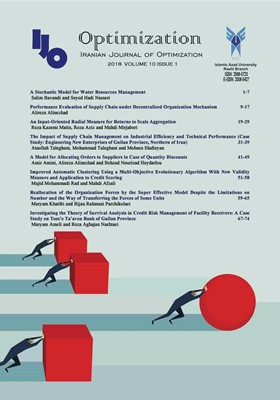An input-oriented radial measure for returns to scale aggregation.
محورهای موضوعی : Data Envelopment AnalysisReza Kazemi Matin 1 , Roza Aziz 2 , Mahdi Mirjaberi 3
1 - Department of Mathematics, Islamic Azad University, Karaj Branch, Karaj, Iran
2 - Department of Mathematics, Islamic Azad University, Karaj Branch, Karaj, Iran
3 - Department of Mathematics, Islamic Azad University, Khorasgan Branch, Isfahan, Iran
کلید واژه: Target setting, Data Envelopment Analysis (DEA), Industry, Aggregation, Input-oriented radial measure, Returns-to-scale (RTS),
چکیده مقاله :
In production theory, it is necessary to be capable of predicting the production func- tion’s long-run behaviors. Hereof, returns to scale is a helpful concept. Returns to scale describes the reaction of a production function to the proportionally scaling all its input variables. In this regard, Data envelopment analysis (DEA) provides a com- prehensive framework for returns to scale evaluation. A sequence of attempts has been made on the subject of returns to scale in DEA literature which cause DEA to be ex- panded to widespread applications. Centralization of carried out studies in firm level, on one hand, and the importance of economical inter-operation in performance analysis in industry level, on the other hand, were the main motivation to start a new range of studies around identifying the return to scale in industry level. This paper collaborates interesting relations between firms and industry technology with performance analysis techniques to extract a relation between returns to scale status of firms and system-wide unit based on the reference set method.
In production theory, it is necessary to be capable of predicting the production func- tion’s long-run behaviors. Hereof, returns to scale is a helpful concept. Returns to scale describes the reaction of a production function to the proportionally scaling all its input variables. In this regard, Data envelopment analysis (DEA) provides a com- prehensive framework for returns to scale evaluation. A sequence of attempts has been made on the subject of returns to scale in DEA literature which cause DEA to be ex- panded to widespread applications. Centralization of carried out studies in firm level, on one hand, and the importance of economical inter-operation in performance analysis in industry level, on the other hand, were the main motivation to start a new range of studies around identifying the return to scale in industry level. This paper collaborates interesting relations between firms and industry technology with performance analysis techniques to extract a relation between returns to scale status of firms and system-wide unit based on the reference set method.
Aparicio, J., Pastor, J. T., & Ray, S. C. (2013). An overall measure of technical inefficiency at the firm and at the industry level: the ‘lost profit on outlay’. European Journal of Operational Research, 226(1), 154-162.
Banker, R. D. (1981). Studies in cost allocation and efficiency evaluation.
Banker, R. D. (1984). Estimating most productive scale size using data envelopment analysis. European Journal of Operational Research, 17(1), 35-44.
Banker, R. D., & Thrall, R. M. (1992). Estimation of returns to scale using data envelopment analysis. European Journal of Operational Research, 62(1), 74-84.
Banker, R. D., Chang, H., & Cooper, W. W. (1996). Equivalence and implementation of alternative methods for determining returns to scale in data envelopment analysis. European Journal of Operational Research, 89(3), 473-481.
Banker, R. D., Charnes, A., & Cooper, W. W. (1984). Some models for estimating technical and scale inefficiencies in data envelopment analysis. Management science, 30(9), 1078-1092.
Charnes, A., Cooper, W. W., & Rhodes, E. (1978). Measuring the efficiency of decision making units. European journal of operational research, 2(6), 429-444.
Cooper, W. W., Seiford, L. M., & Tone, K. (2006). Introduction to data envelopment analysis and its uses: with DEA-solver software and references. Springer Science & Business Media.
Cooper, W. W., Thompson, R. G., & Thrall, R. M. (1996). Chapter 1 Introduction: Extensions and new developments in DEA. Annals of operations Research, 66(1), 1-45.
Färe, R., & Zelenyuk, V. (2005). On Farrell's Decomposition and aggregation. International Journal of Business and Economics, 4(2), 167.
Färe, R., Grosskopf, S., & Li, S. K. (1992). Linear programming models for firm and industry performance. The Scandinavian Journal of Economics, 94(4), 599-608.
Färe, R., Grosskopf, S., & Lovell, C. K. (1985). The measurement of efficiency of production (Vol. 6). Springer Science & Business Media.
Farrell, M. J. (1957). The measurement of productive efficiency. Journal of the Royal Statistical Society. Series A (General), 120(3), 253-290.
Førsund, F. R., & Hjalmarsson, L. (1979). Generalised Farrell measures of efficiency: an application to milk processing in Swedish dairy plants. The Economic Journal, 89(354), 294-315.
Johansen, L., & Johansen, L. (1972). Production functions; an integration of micro and macro, short run and long run aspects (No. 04; HB141, J64.).
Leleu, H., & Briec, W. (2009). A DEA estimation of a lower bound for firms’ allocative efficiency without information on price data. International Journal of Production Economics, 121(1), 203-211.
Li, S. K., & Ng, Y. C. (1995). Measuring the productive efficiency of a group of firms. International Advances in Economic Research, 1(4), 377-390.
Tone, K. (1996). A simple characterization of returns to scale in DEA. Journal of the Operations Research Society of Japan, 39(4), 604-613.
Tone, K., & Sahoo, B. K. (2006). Re-examining scale elasticity in DEA. Annals of Operations Research, 145(1), 69-87.
Zarepisheh, M., Khorram, E., & Jahanshahloo, G. R. (2010). Returns to scale in multiplicative models in data envelopment analysis. Annals of Operations Research, 173(1), 195-206.


